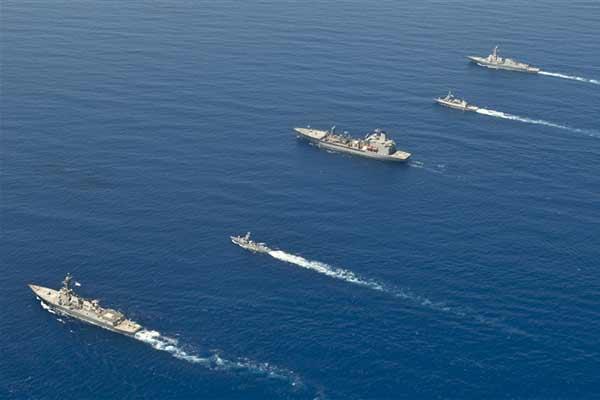U.S. and Israeli commanders Wednesday outlined joint anti-missile defense exercises to begin in Israel later this month that both sides insisted were not aimed at the Iranian threat.
The Navy said the same thing last month about the International Mine Counter-Measures Exercise 2012 in the Persian Gulf with more than 20 allies that focused on keeping the oil lifeline through the Strait of Hormuz open in the event that an unnamed enemy planted mines in the sea lanes.
Operation Austere Challenge 2012, billed as "the largest and most complex joint exercise ever conducted" by the U.S. and Israel, "doesn't look at any particular threat" in the region and "is not related to national elections" in the U.S., said Air Force Lt. Gen. Craig Franklin.
"This is not related to any recent world events," said Franklin, the commander of the Third Air Force at Ramstein Air Base, Germany, who will be the top U.S. officer in Israel for Austere Challenge. "It is a defensive exercise. It looks at a threat that's notional."
"It's not there to send a message," said Israeli Brig. Gen. Nitzan Nuriel, but "anybody can take any lesson he wants from this exercise. We know we have to deal with potential threats coming from all fronts."
In a conference call from Ramstein, both Nuriel and Franklin said a total of about 3,500 U.S. troops would take part in the simulated exercises, with about 1,000 on the ground in Israel's Negev desert.
Hundreds of U.S. troops have already begun arriving at the Israeli port of Ashdod. The U.S. will put up about $30 million for the exercise, with Israel contributing a similar amount.
The exercise, which will last about three weeks and continue through the U.S. presidential election, will take place as President Obama and former Gov. Mitt Romney both seek to portray themselves as the strongest supporter of Israel in the final weeks of the campaign.
Austere Challenge will be coordinated by a U.S. Aegis cruiser operating off Israel's coast and focus on meshing U.S. defenses with Israel on threats ranging from mortars to long-range missiles.
U.S. troops will have the opportunity to become familiar with Israel's David's Sling short-range missile interceptor, Arrow 2 long-range interceptors and Iron Dome system against rocket and artillery attacks, Nuriel said.
The U.S. will deploy Patriot air defense systems to Israel but the hit-to-kill Terminal High Altitude Area Defense system to shoot down short, medium, and intermediate ballistic missiles will not be part of the exercise since "the system is currently committed" elsewhere in the region, Franklin said.
Last spring, the U.S. approved the sale of a Lockheed Martin THAAD system of mobile launchers to the United Arab Emirates as part of the military buildup in the Gulf against the threat from Iran.
The Austere Challenge exercise was taking place amid rising tensions in the region over the Syrian civil war and the threat from Iran's nuclear program. Israeli forces earlier this week also shot down a drone, believed to have been launched by the Hezbollah group in Lebanon that flew for about three hours over Israel.
Last week, Defense Secretary Leon Panetta confirmed that about 150 U.S. troops had arrived in Jordan, where Syrian refugees have been fleeing by the thousands to escape the violence.
"We have a group of our forces there working to help build a headquarters there and to insure that we make the relationship between the United States and Jordan a strong one so that we can deal with all the possible consequences of what's happening in Syria," Panetta said.
Gen. Martin Dempsey, the chairman of the Joint Chiefs of Staff, was expected to arrive next week on his second visit to Israel to observe the Austere Challenge exercise and also meet with Israeli leaders on the Iranian threat that has frayed relations between President Obama and Israeli Prime Minister Benjamin Netanyahu.
The two leaders have been at odds on when Iran might be capable of producing a nuclear weapon, and the dispute was partly behind the postponement of Austere Challenge, which was originally scheduled for last spring.
The U.S. scaled down the number of troops taking part in Israel from 3,000 to 1,000 and also cut back on the number of Aegis cruisers from two to one.
But the dispute between Obama and Netanyahu appeared to ease last month when the Israeli leader told the United Nations that military action against Iran could wait at least until next spring.



























